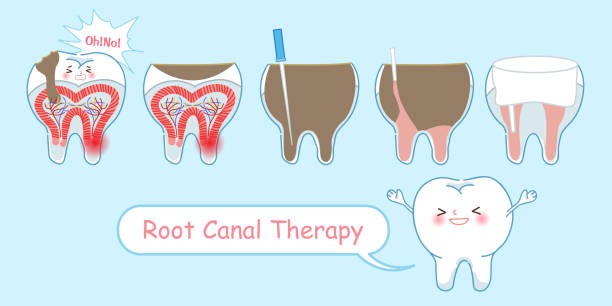Table of Contents:
- What Is A Root Canal?
- Why Root Canals Are Needed
- Pain Before The Procedure
- Comfort Measures And Preparation
- What Happens During A Root Canal?
- Pain After The Root Canal
- Recovery Tips & Aftercare
- Debunking Root Canal Myths
What Is A Root Canal?
A root canal is a dental procedure that addresses infection or inflammation inside a tooth, specifically within the pulp, containing nerves and blood vessels. When the pulp is damaged by decay, trauma, or deep cavities, it must be removed to save the tooth and alleviate pain. Many individuals fear this treatment, but modern approaches, like root canal treatments in Ohio, have transformed the experience. Dentists and endodontists use advanced techniques and equipment to make this common procedure more comfortable and efficient than ever before. According to the American Dental Association, root canals are performed millions of times yearly, demonstrating their importance in helping people keep their natural teeth longer and avoiding more complex treatments like extractions or implants.
Why Root Canals Are Needed
Root canals become necessary when bacteria invade the pulp through deep decay, cracks, or faulty fillings. If untreated, this infection can spread—leading to severe pain, an abscess, and even bone loss around the tooth. In addition to pain relief, prompt treatment of a damaged tooth protects the neighboring teeth and gums. Research from the National Institutes of Health confirms that timely root canal therapy prevents more serious problems and offers lasting relief by preserving the structure and integrity of the tooth.
Pain Before The Procedure
One of the primary indicators that you might need a root canal is persistent tooth pain, which could be sharp or throbbing or worsen with biting and chewing. Sensations of sensitivity to hot or cold that won’t subside, swelling, or gum tenderness are typical warning signs. This discomfort is a response to infection or inflammation deep inside the tooth, and it generally grows worse if left untreated. North Orange Family Dentistry emphasizes that addressing the pain promptly with a root canal can provide fast, long-term relief and stop the infection from causing further damage.
Comfort Measures And Preparation
To make a root canal as stress-free as possible, preparation begins beforehand. Dentists recommend maintaining good oral hygiene, taking prescribed antibiotics if needed, and sharing your complete health history. Eat a filling meal before your appointment (unless sedation is planned), and arrange for someone to drive you if you’ll be sedated. Patients are encouraged to openly communicate anxieties and ask questions, as this helps tailor the experience to each case and reduces fear.
What Happens During A Root Canal?
Thanks to improvements in dental care, the root canal procedure has become straightforward. After numbing the area with local anesthesia, the dentist isolates the tooth to keep it dry and clean. An access point is made, the infected pulp is carefully removed, and the inner chamber is cleaned, shaped, and disinfected. Afterward, the empty space is sealed with a biocompatible material, followed by a temporary or permanent filling. Most patients feel only light pressure throughout the procedure, with numbness ensuring they remain pain-free.
Pain After The Root Canal
Most people are surprised by the minimal discomfort following a root canal. Mild soreness or sensitivity for a few days afterward is expected but usually fades with over-the-counter pain relievers and gentle self-care. Discomfort should steadily improve as inflammation subsides, and the tooth heals. Persistent or intense pain is uncommon and warrants a call to the dentist for a follow-up visit.
Recovery Tips & Aftercare
Good aftercare is key to a speedy recovery. Avoid chewing on the treated tooth until a protective crown or permanent restoration is applied. Follow daily brushing and flossing routines, treat your gums gently, and stick with soft, cool foods in the first 24 hours. Regular dental visits and x-rays ensure the tooth remains healthy over time, while prompt restoration with a crown prevents fractures or reinfection.
Debunking Root Canal Myths
Old myths about painful root canals persist, but current dental technology and anesthesia make them far less daunting. For most patients, root canals eliminate pain rather than cause it. The success rate is high, and clinical evidence shows that treated teeth often last a lifetime with proper care. Tooth extraction, by contrast, comes with higher risks of shifting teeth and bone loss, making root canals the preferred tooth-saving solution for many.

